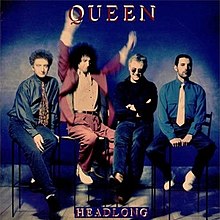
Innuendo is the fourteenth studio album by the British rock band Queen, released on 4 February 1991 by Parlophone in the United Kingdom and it is the band's first studio album to be released by Hollywood Records in the United States. Produced by David Richards and the band, it was the band's last album to be released in lead singer Freddie Mercury's lifetime, and their most recent one to be composed of entirely new material, save for The Cosmos Rocks by the Queen + Paul Rodgers collaboration. It reached the No. 1 spot on the UK album charts for two weeks, and also peaked at No. 1 in Italy, the Netherlands, Germany, and Switzerland, staying at No. 1 for three weeks, four weeks, six weeks, and eight weeks, respectively. It was the first Queen album to go Gold in the US upon its release since The Works in 1984.
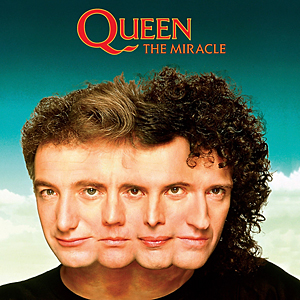
The Miracle is the thirteenth studio album by the British rock band Queen, released on 22 May 1989 by Parlophone Records and Capitol Records in both the United Kingdom and the U.S. respectively, where it was the band's only studio album to be released on latter label. The album was recorded as the band recovered from Brian May's marital problems and Freddie Mercury's HIV diagnosis in 1987. Recording started in January 1988 and lasted for an entire year. The album was originally going to be called The Invisible Men, but three weeks before the release, according to Roger Taylor, they changed the name to The Miracle. It was also the last Queen album with a photo of the band on the front cover.

"I Was Born to Love You" is a 1985 song by Freddie Mercury that was released as a single from his first solo album, Mr. Bad Guy. After Mercury's death, Queen re-worked this song for their album Made in Heaven in 1995, by having the other members play their instrumental parts over the original track, transforming the song from disco to rock. The Queen version from the Made in Heaven album also includes snippets of Mercury's ad-lib vocals taken from "A Kind of Magic" and from "Living on My Own".

"I Want to Break Free" is a song by the British rock band Queen, written by their bassist John Deacon. It appears on the album The Works (1984), and was released in three versions: album, single and extended. The track became a staple of the bands during their 1984–85 Works Tour and their 1986 Magic Tour.

"These Are the Days of Our Lives" is a song by the British rock band Queen. Although credited to the whole band, it was largely written by their drummer Roger Taylor, and is the eighth track on the band's 1991 album Innuendo.

"Innuendo" is a song by the British rock band Queen. Written by Freddie Mercury and Roger Taylor but credited to Queen, it is the opening track on the album of the same name (1991), and was released as the first single from the album. The single debuted at number one on the UK Singles Chart in January 1991, the band's first number-one hit since "Under Pressure" in 1981, and additionally reached the top ten in ten other countries. It is included on the band's second compilation album Greatest Hits II. It was described as "the band's first complex work released after the 1970s".

"One Vision" is a song written and recorded by the British rock band Queen, first released as a single in November 1985 and then included on their 1986 album A Kind of Magic. It was conceived by the group's drummer Roger Taylor.
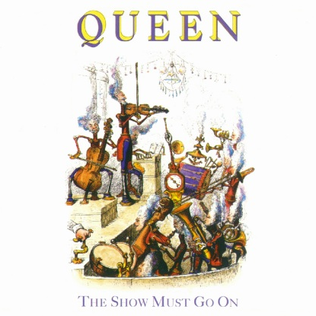
"The Show Must Go On" is a song by British rock band Queen, featured as the twelfth and final track on their 1991 album, Innuendo. It is credited to Queen, but written mainly by Brian May. The song chronicles the effort of frontman Freddie Mercury continuing to perform despite approaching the end of his life, although his diagnosis with HIV/AIDS had not yet been made public in spite of ongoing media speculation claiming that he was seriously ill. When the band recorded the song in 1990, Mercury's condition had deteriorated to the point that May had concerns as to whether he was physically capable of singing it. May recalls; "I said, 'Fred, I don't know if this is going to be possible to sing.' And he went, 'I'll fucking do it, darling'—vodka down—and went in and killed it, completely lacerated that vocal".

"No-One But You " is the final single recorded by the British rock band Queen. Recorded and released in 1997, six years after the death of lead singer Freddie Mercury, it is the only Queen recording to feature a three-piece lineup: guitarist Brian May, drummer Roger Taylor, and bassist John Deacon. May and Taylor share lead vocals. The song was released on the album Queen Rocks and it was also released as a double a-side single with "Tie Your Mother Down". It was later included on the compilation album Greatest Hits III.
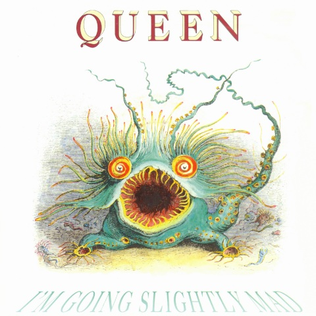
"I'm Going Slightly Mad" is a song by the British rock band Queen. Written by Freddie Mercury but credited to Queen, with uncredited lyrical contributions by Peter Straker, it was released as the second single from the band's 1991 album Innuendo. The song was released as a single on 4 March 1991, a month after the release of the album. The lyrics and the accompanying music video project the song as humorous and light-hearted, despite the lyrics dealing with the mental decline Mercury was experiencing as one of the effects of advancing AIDS.

"Bicycle Race" is a song by the British rock band Queen. It was released on their 1978 album Jazz and written by Queen's lead singer Freddie Mercury. It was released as a double A-side single together with the song "Fat Bottomed Girls", reaching number 11 in the UK Singles Chart and number 24 in the Billboard Hot 100 in the US. The song is included in their 1981 Greatest Hits compilation.

"Too Much Love Will Kill You" is a song written by British guitarist Brian May of Queen, Frank Musker and Elizabeth Lamers. The song reflected the breakdown of May's first marriage and attraction to his future wife, Anita Dobson. It was first recorded by Queen around 1988 or before, and was intended to be on the band's The Miracle album in 1989, but did not make the cut due to legal disputes following the band's decision that all songs on the album would be written by the group as opposed to individuals.

"I Want It All" is a song by British rock band Queen, featured on their 1989 studio album, The Miracle. Written by guitarist and vocalist Brian May and produced by David Richards, it was released as the first single from the album on 2 May 1989. "I Want It All" reached number three on the singles charts of the United Kingdom, Finland, Ireland and New Zealand, as well as on the US Billboard Album Rock Tracks chart. Elsewhere, it peaked at number two in the Netherlands and charted within the top 10 in Australia, Belgium, Germany, Norway and Switzerland. With its message about fighting for one's own goals it became an anti-apartheid protest song in South Africa.
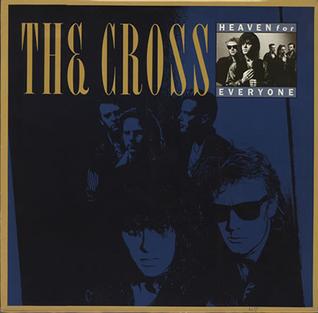
"Heaven for Everyone" is a song written by Queen drummer Roger Taylor. It originally appeared on his side project the Cross's album Shove It, with Freddie Mercury as a guest vocalist, and it is the album's fourth track. It was reworked with Queen's music and appeared in the 1995 album Made in Heaven where it was the seventh track, and was released as the first single – four years after Mercury's death. Queen's version reached number two on the UK Singles Chart while peaking at number one in Hungary and becoming a top-ten hit in several other European nations. In 1999 it was included in Queen’s compilation album Greatest Hits III.
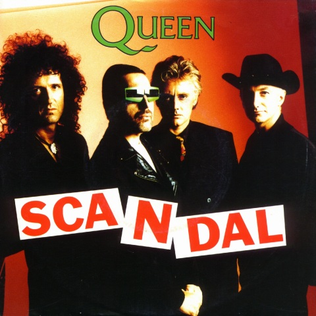
"Scandal" is a song by the British rock band Queen. It was released as the fourth single from their 1989 album The Miracle and peaked at #25 in the UK. The single was released in the United States but failed to chart.

"It's a Hard Life" is a song by the British rock band Queen, written by lead singer Freddie Mercury. It was featured on their 1984 album The Works, and it was the third single from that album. In 1991 it was included in the band’s second compilation album Greatest Hits II.

"The Miracle" is the fifth and final single from Queen's 1989 studio album of the same name. It was composed by the entire band, though Freddie Mercury and John Deacon were the main writers. It was released as a single on 27 November 1989 and it was the band's final single release of the 1980s.
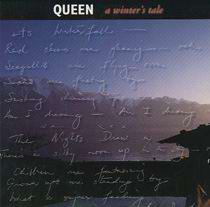
"A Winter's Tale" is a song by Queen, from the album Made in Heaven, released in 1995 after Freddie Mercury's death in 1991. It was written after the Innuendo sessions, inspired as Mercury was staring out the windows of various places in Montreux. The song has a psychedelic, dreamy feel, and describes what Mercury saw outside the windows.

"Made in Heaven" is the third single recorded by Freddie Mercury, and his fourth release as a solo artist. Originally featured in Mercury's first solo album, Mr. Bad Guy, the song was slightly modified and published as a 45 rpm single paired with "She Blows Hot and Cold", described on the record sleeve as 'A Brand New Track'. The single reached No. 57 on the UK Singles Chart.
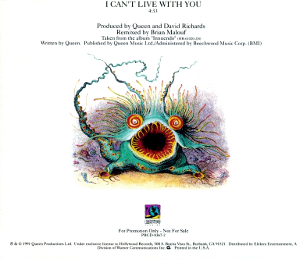
"I Can't Live with You" is a song by the British rock band Queen, which was released in 1991 as the fourth single from their fourteenth studio album Innuendo. The song was written by Brian May but credited to all four members of Queen. It was produced by Queen and David Richards. "I Can't Live with You" was released as a promotional single in the United States only, where it reached No. 28 on the Billboard Album Rock Tracks chart in June 1991.
